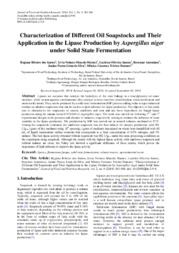Characterization of different oil soapstocks and their application in the lipase production by Aspergillus niger under solid state fermentation.
Characterization of different oil soapstocks and their application in the lipase production by Aspergillus niger under solid state fermentation.
Resumo: Lipases are enzymes that catalyze the hydrolysis of the ester linkage in a triacylglycerol oil-water interface, while in non-aqueous environments they catalyze reverse reactions (esterification, transesterification and interesterification). They can be produced by a solid state fermentation (SSF) process adding value to agro-industrial residues as alkaline soapstocks that can be used as a lipid substrate for lipase production. The objective of this study was to characterize the soapstocks of canola, sunflower and corn and use these byproducts for fungal lipase production using the mutant strain 11T53A14 of Aspergillus niger. The work was carried out following 24-1 and 23 experimental designs in the presence and absence of inducers, respectively, aiming to evaluate the influence of some variables in the lipase production. The production by SSF was carried out in aerated columns incubated at 32°C. Among the soapstocks evaluated, the sunflower soapstock was the best inducer for enzyme production, with 201 U/gdm (gram of dry medium) using 108 spores/gm (gram of medium) inoculated on wheat bran humidified with 80 mL of liquid (ammonium sulfate solution) that corresponds to a final concentration of 0.5% nitrogen, and 3% inducer. The best lipase activity obtained without soapstock was 182 U/gdm under the same processing conditions as the experiment using soapstock. Although the results with the highest lipase activity with sunflower soapstock and without inducer are close, the Tukey test showed a significant difference of these results, which proves the importance of lipid substrate to improve the lipase activity.
Ano de publicação: 2014
Tipo de publicação: Artigo de periódico
Unidade: Embrapa Agroindústria de Alimentos
Observações
1 - Por padrão são exibidas publicações dos últimos 20 anos. Para encontrar publicações mais antigas, configure o filtro ano de publicação, colocando o ano a partir do qual você deseja encontrar publicações. O filtro está na coluna da esquerda na busca acima.
2 - Para ler algumas publicações da Embrapa (apenas as que estão em formato ePub), é necessário ter, no celular ou computador, um desses softwares gratuitos. Sistemas Android: Google Play Livros; IOS: iBooks; Windows e Linux: software Calibre.
Acesse outras publicações
Acesse a Base de Dados da Pesquisa Agropecuária (BDPA) para consultar o acervo completo das bibliotecas da Embrapa.

